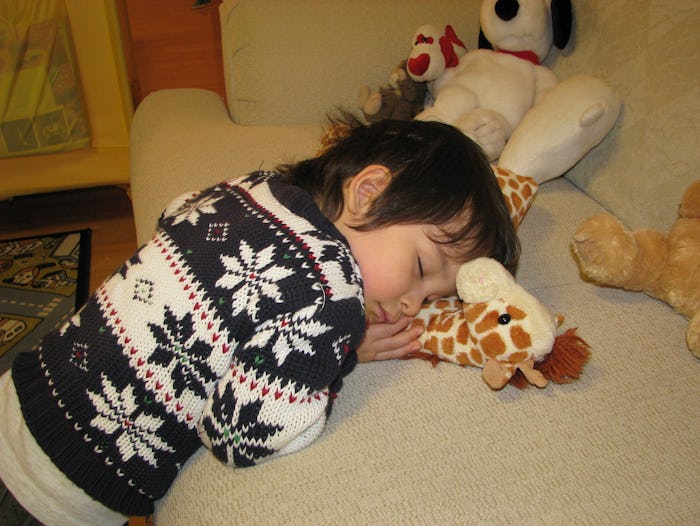Life
9 Things That Happen To Your Kid's Body When They Don't Get Enough Sleep
If there is one thing that parents want, it is for their kids to sleep. Whether they are infants or teenagers, getting them to sleep an appropriate number of hours is a never ending struggle. You have been told that getting enough rest is important for the mind, but do you realize all of the things that happen to your kid's body when they don't get enough sleep?
The University of Michigan Health System reports that children need as many as 16 hours of sleep per day when they are first born. By the time they turn 16, teens should be sleeping no less than nine hours per night. As parents, we know that between homework, sports, and other extracurricular activities, our children are lucky to get a full eight hours, especially with school start times as early as 7 a.m. in some parts of the country.
Other factors that can keep our kids awake are electronics, stressing about schoolwork or exams, drinking caffeine, high intensity activities right before bed (such as exercising or a particularly difficult assignment), and medications. Some medicines to treat allergy or other health conditions make falling asleep more difficult.
It's important to watch out for the signs of sleep deprivation in your child, and make yourself familiar with its side-effects. Here are a few things that can happen to a child's body when they aren't getting the right amount of sleep.
1Weight Gain
Lack of sleep also affects a child's metabolism. Because bodies that are tired create more appetite-increasing hormones, sleepy children may be hungrier and can be drawn to high-calorie foods according to WebMD.
2Growth Deficit
Judith Owens, director of sleep medicine at Children's National Medical Center, in Washington, D.C., told Parents that a child's growth hormone is primarily secreted while they sleep. Kids who don't get enough sleep may not reach their full height potential.
3Illness
Proteins known as cytokines, are produced during sleep, according to Parents. The body relies on cytokines to fight infection, illness, and stress. Sleeping too little can affect the number of cytokines that the body produces.
4Vascular Damage
Parents also reports that when children don't get enough sound sleep, their blood glucose and cortisol will remain elevated during the night. This is linked to a greater risk of diabetes, obesity, and heart disease according to Dr. Jeffrey Durmer, an Atlanta sleep specialist.
5Bad Moods
Jodi A. Mindell, associate director of the Sleep Disorders Center at the Children's Hospital of Philadelphia told WebMD that when children don't get enough sleep, they have trouble regulating their emotions. Much of teen grouchiness can be attributed to not getting enough sleep.
6Trouble In School
Kids who don't get enough sleep often struggle in school due to poor memory. Parents reports that children who were studied by Neuroscientists at the University of Massachusetts Amherst scored better on a memory game after napping than the students who did not nap. The National Sleep Foundation also noted that too little sleep limits your ability to learn, listen, concentrate and solve problems.
7Low Attention Span
Dr. Owens also warns that children who consistently sleep fewer than ten hours per night before the age of three are three times more likely to exhibit signs of ADHD by age six. She adds that sleep deprivation and ADHD have almost identical symptoms.
8Acne
Lack of sleep can contribute to pimples and other skin problems, making kids more prone to sever acne, according to The National Sleep Foundation.
9Bad Judgment
Dr. Mindell tells WebMD that kids who are overtired have a harder time making good decisions. This can include posting inappropriate content to social media, or being influenced by the wrong crowd.
This article was originally published on
